Garden Maintenance in Kingston
Introduction
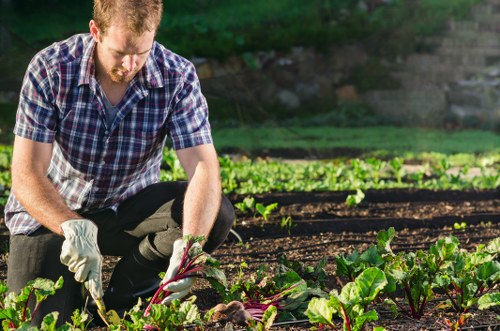
Maintaining a beautiful garden in Kingston requires a combination of knowledge, dedication, and the right tools. Whether you're a seasoned gardener or just starting out, understanding the unique climate and soil conditions of Kingston is essential for thriving plant life.
Garden maintenance encompasses a wide range of activities, from routine tasks like watering and weeding to more specialized practices such as pruning and soil conditioning. Proper maintenance not only enhances the aesthetic appeal of your garden but also promotes the health and longevity of your plants.
In this article, we'll explore the various aspects of garden maintenance in Kingston, providing you with practical tips and insights to keep your garden vibrant throughout the year.
The Importance of Garden Maintenance
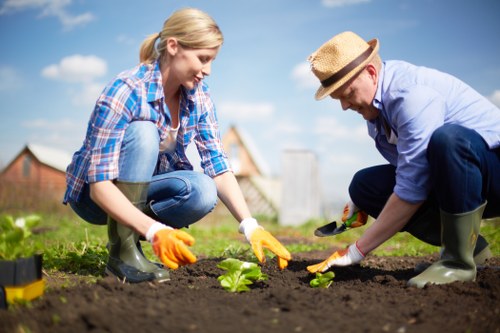
Regular garden maintenance is crucial for several reasons. Firstly, it ensures that your plants receive the necessary nutrients and care to grow strong and healthy. This involves timely watering, fertilizing, and protecting plants from pests and diseases.
Secondly, consistent maintenance helps in preventing overgrowth and clutter. Trimming hedges, pruning trees, and removing dead or diseased foliage not only keep your garden tidy but also reduce the risk of potential plant health issues.
Moreover, a well-maintained garden can significantly increase the value of your property. It creates a welcoming environment, enhances curb appeal, and provides a serene outdoor space for relaxation and enjoyment.
Seasonal Maintenance Tasks
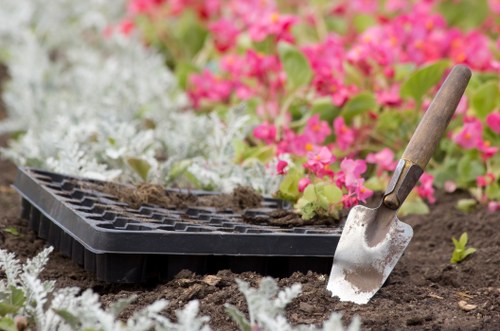
Spring
Spring is a critical time for garden maintenance in Kingston. As the weather warms, it's essential to prepare your garden for the growing season ahead.
Key tasks include clearing out winter debris, testing and amending the soil, and planting spring-blooming flowers and shrubs. This is also the time to prune perennials and prepare vegetable beds for planting.
Summer
During the summer months, maintaining adequate moisture levels is vital. Regular watering, especially during dry spells, ensures that your plants remain healthy and vibrant.
Weeding is another important task, as uncontrolled weeds can compete with your plants for nutrients and water. Additionally, summer is the time to monitor for pests and diseases, taking prompt action to address any issues.
Fall
Fall brings the opportunity to prepare your garden for the colder months. This includes planting fall vegetables, dividing perennials, and adding mulch to protect plant roots from freezing temperatures.
It's also a good time to rake fallen leaves and compost them, which enriches the soil and reduces the risk of fungal diseases.
Winter
In winter, focus on protecting your garden from frost and snow. This may involve covering sensitive plants, pruning dormant trees, and maintaining garden tools.
Planning for the next gardening season by researching new plants and designing garden layouts can also be a productive use of winter months.
Choosing the Right Plants for Kingston
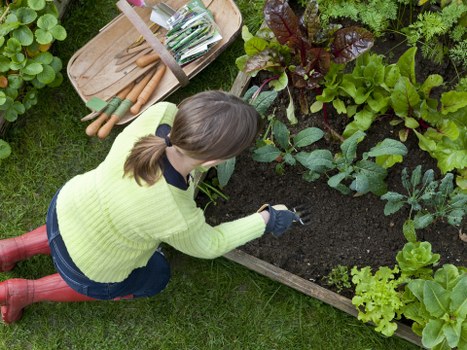
Selecting plants that are well-suited to Kingston's climate and soil conditions is fundamental for a thriving garden. Native plants often perform better as they are adapted to the local environment.
Consider factors such as sunlight exposure, soil type, and moisture levels when choosing plants. Consulting with local nurseries or gardening experts can provide valuable insights into the best plant selections for your specific garden conditions.
- Native Shrubs: Shrubs like Viburnum and Rhododendron are well-adapted to Kingston's climate.
- Perennials: Plants such as Hostas and Daylilies offer beauty and resilience.
- Vegetables: Tomatoes, peppers, and leafy greens thrive in the Kingston garden.
Lawn Care
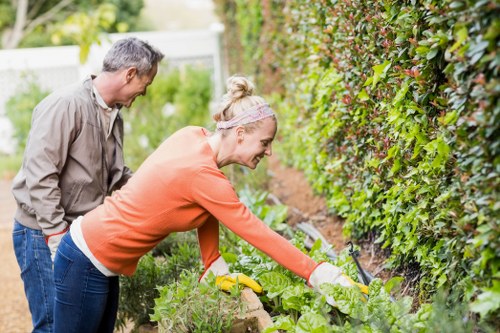
A healthy lawn serves as the foundation of a beautiful garden. Proper lawn care involves regular mowing, watering, and fertilizing to maintain lush, green grass.
It's important to mow your lawn at the correct height to promote root growth and prevent stress on the grass. Water deeply but infrequently to encourage strong roots and reduce weed growth.
Additionally, aerating the soil and overseeding can help improve lawn density and address bare spots, ensuring a uniformly green and healthy lawn.
Pruning and Trimming
Pruning is essential for maintaining the shape and health of your plants. It involves removing dead or diseased branches, as well as shaping plants to encourage proper growth.
Regular trimming of hedges and shrubs ensures they remain tidy and promotes dense, attractive foliage. Pruning also helps improve air circulation, reducing the risk of fungal infections.
When pruning, always use sharp, clean tools to make precise cuts, and follow specific guidelines for each plant type to avoid damaging them.
Pest and Disease Management
Effective pest and disease management is critical for a healthy garden. Regularly inspect your plants for signs of pests or diseases, such as discolored leaves, spots, or unusual growth patterns.
Implementing integrated pest management (IPM) practices can help control pests while minimizing environmental impact. This includes using natural predators, organic pesticides, and cultural practices to reduce pest populations.
- Biological Control: Introducing beneficial insects like ladybugs can help manage pest populations.
- Organic Pesticides: Neem oil and insecticidal soap are effective against various garden pests.
- Cultural Practices: Crop rotation and proper spacing can prevent the spread of diseases.
Soil Health and Fertilization
Healthy soil is the foundation of a thriving garden. Regularly testing your soil can help determine its pH levels and nutrient content, allowing you to make informed decisions about amendments.
Adding compost and organic matter improves soil structure, enhances fertility, and promotes beneficial microbial activity. Fertilizing at the right time ensures that your plants receive the necessary nutrients for optimal growth.
Maintaining soil health also involves practices like mulching, which helps retain moisture, suppress weeds, and regulate soil temperature.
Irrigation Systems
Efficient irrigation is key to successful garden maintenance. Selecting the right irrigation system, whether it's drip irrigation, sprinklers, or soaker hoses, depends on your garden's specific needs and layout.
Automated irrigation systems can help conserve water by delivering it directly to the plant roots, reducing evaporation and runoff. Additionally, scheduling watering times during early morning or late evening minimizes water loss.
Regularly checking and maintaining your irrigation system ensures it operates effectively, preventing overwatering or underwatering that can harm your plants.
Landscaping Ideas
Creative landscaping enhances the beauty and functionality of your garden. Incorporating elements like pathways, garden beds, and focal points can add visual interest and guide visitors through your space.
Using a mix of plant types, colors, and textures creates a dynamic and aesthetically pleasing environment. Additionally, adding structures like pergolas, benches, or water features can provide both beauty and utility.
- Pathways: Create walking paths with natural stone or gravel to add structure to your garden.
- Focal Points: Use statues, birdbaths, or unique plants as centerpieces.
- Seating Areas: Incorporate benches or patio furniture for relaxation.
Hiring Professional Garden Maintenance Services
While DIY garden maintenance can be rewarding, hiring professional services offers expertise and efficiency. Professional gardeners bring extensive knowledge of plant care, pest management, and landscape design.
They can provide tailored maintenance plans that suit your garden's specific needs, ensuring that every aspect is meticulously cared for. Additionally, professionals have access to specialized tools and products that may not be readily available to homeowners.
Investing in professional garden maintenance can save you time and effort, allowing you to enjoy a beautiful garden without the stress of upkeep.
DIY vs Professional Services
Deciding between DIY and professional garden maintenance depends on various factors, including your skill level, available time, and the complexity of your garden.
DIY maintenance offers flexibility and can be cost-effective, but it requires a significant time commitment and a certain level of expertise to achieve desired results.
- DIY Advantages: Cost savings, personal satisfaction, and full control over gardening practices.
- Professional Advantages: Expertise, time efficiency, and access to advanced tools and techniques.
For larger or more intricate gardens, or if you lack the necessary time or knowledge, professional services may be the better option to ensure optimal maintenance and growth.
Sustainable Gardening Practices
Adopting sustainable gardening practices not only benefits the environment but also promotes a healthier garden. This includes using organic fertilizers, conserving water, and reducing chemical pesticide use.
Implementing composting reduces waste and enhances soil fertility. Additionally, selecting native and drought-resistant plants minimizes water usage and supports local biodiversity.
Mulching and cover cropping are other sustainable practices that help in retaining soil moisture, preventing erosion, and suppressing weeds, leading to a more resilient garden ecosystem.
Tools and Equipment Needed
Having the right tools is essential for effective garden maintenance. Basic tools include a quality pair of pruners, a sturdy shovel, a rake, and a watering can or hose.
For more advanced maintenance, consider investing in tools like an aerator, a tiller, and a lawnmower. Regularly maintaining your tools ensures they remain effective and safe to use.
Additionally, safety gear such as gloves, protective eyewear, and sturdy footwear can prevent injuries and enhance your gardening experience.
Common Garden Problems in Kingston
Gardeners in Kingston often face challenges such as pest infestations, diseases, and adverse weather conditions. Understanding these common problems can help in proactively addressing them.
Pests like aphids, slugs, and beetles can damage plants, while diseases such as powdery mildew and rust affect foliage and overall plant health.
- Weather-Related Issues: Heavy rains can cause flooding, while droughts stress plants.
- Soil Compaction: Heavy foot traffic can lead to compacted soil, hindering root growth.
- Weed Invasion: Invasive weeds compete with your plants for resources.
Implementing preventive measures and timely interventions can mitigate these issues, ensuring a resilient and thriving garden.
Tips for a Beautiful Garden Year-Round
Maintaining a beautiful garden throughout the year requires planning and consistent care. Here are some tips to keep your garden vibrant in every season:
- Plan Ahead: Design your garden with seasonal changes in mind, selecting plants that offer year-round interest.
- Regular Maintenance: Stick to a maintenance schedule that includes watering, pruning, and fertilizing.
- Adapt to Seasons: Adjust your gardening practices based on seasonal needs, such as mulching in winter or planting in spring.
- Monitor Plant Health: Regularly inspect your plants for signs of stress, pests, or diseases.
- Enhance Soil Quality: Continuously improve soil health with organic matter and proper fertilization.
By following these tips, you can enjoy a lush and beautiful garden all year long, adapting to the changing seasons with ease.
Conclusion

Garden maintenance in Kingston is a rewarding endeavor that enhances the beauty and value of your property. By understanding the unique requirements of your garden and implementing effective maintenance practices, you can cultivate a thriving and resilient outdoor space.
Whether you choose to maintain your garden yourself or enlist the help of professional services, the key is consistency and attention to detail. Embrace sustainable practices, stay informed about the best gardening techniques, and enjoy the myriad benefits that a well-maintained garden offers.
Ready to transform your garden? Contact us today to book your garden maintenance service and take the first step towards a stunning Kingston garden!